Strategic Management and Sustainability: Private Sector Role
VerifiedAdded on 2022/12/23
|9
|2604
|90
Essay
AI Summary
This essay delves into the critical intersection of strategic management and sustainability, with a specific focus on the private sector's role in addressing global challenges. The essay begins by defining strategic management and sustainability, emphasizing their importance for business success and environmental stewardship. A literature review explores how the private sector contributes to sustainable development goals, particularly in waste reduction and employment. The essay highlights innovative approaches used by the manufacturing sector to mitigate climate change and poverty, such as the 'Just in Time' approach and recruitment of local talent. It also discusses the challenges faced, including waste management, investment shortages, and the need for influential leadership. The conclusion emphasizes the private sector's contribution to solving global issues, while the recommendations suggest further CSR practices, such as promoting women's status and investing in renewable energy to enhance sustainability. The essay concludes by underlining the opportunities for the manufacturing industry to increase revenue, and make a positive impact on society, economy, and global concerns.
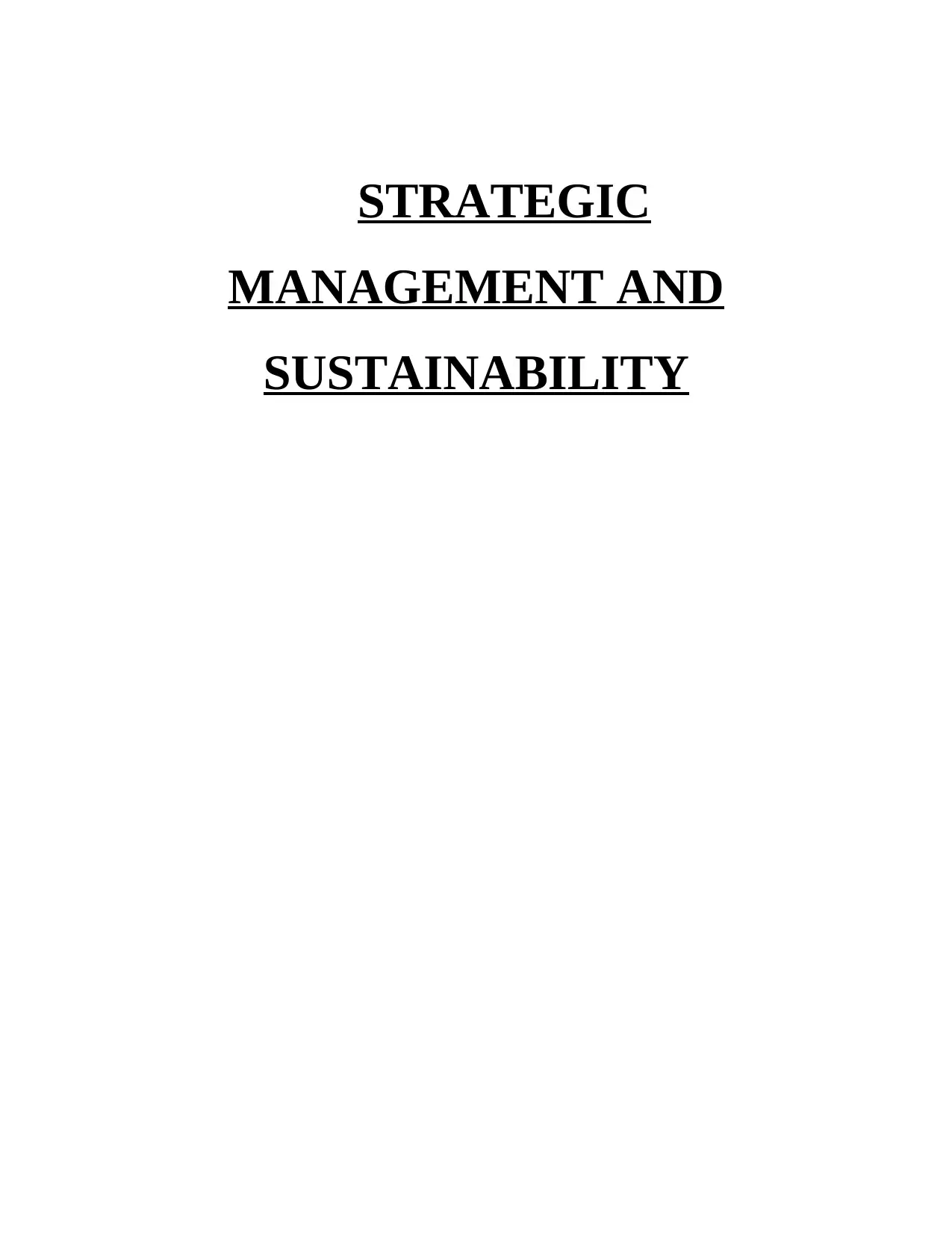
STRATEGIC
MANAGEMENT AND
SUSTAINABILITY
MANAGEMENT AND
SUSTAINABILITY
Paraphrase This Document
Need a fresh take? Get an instant paraphrase of this document with our AI Paraphraser
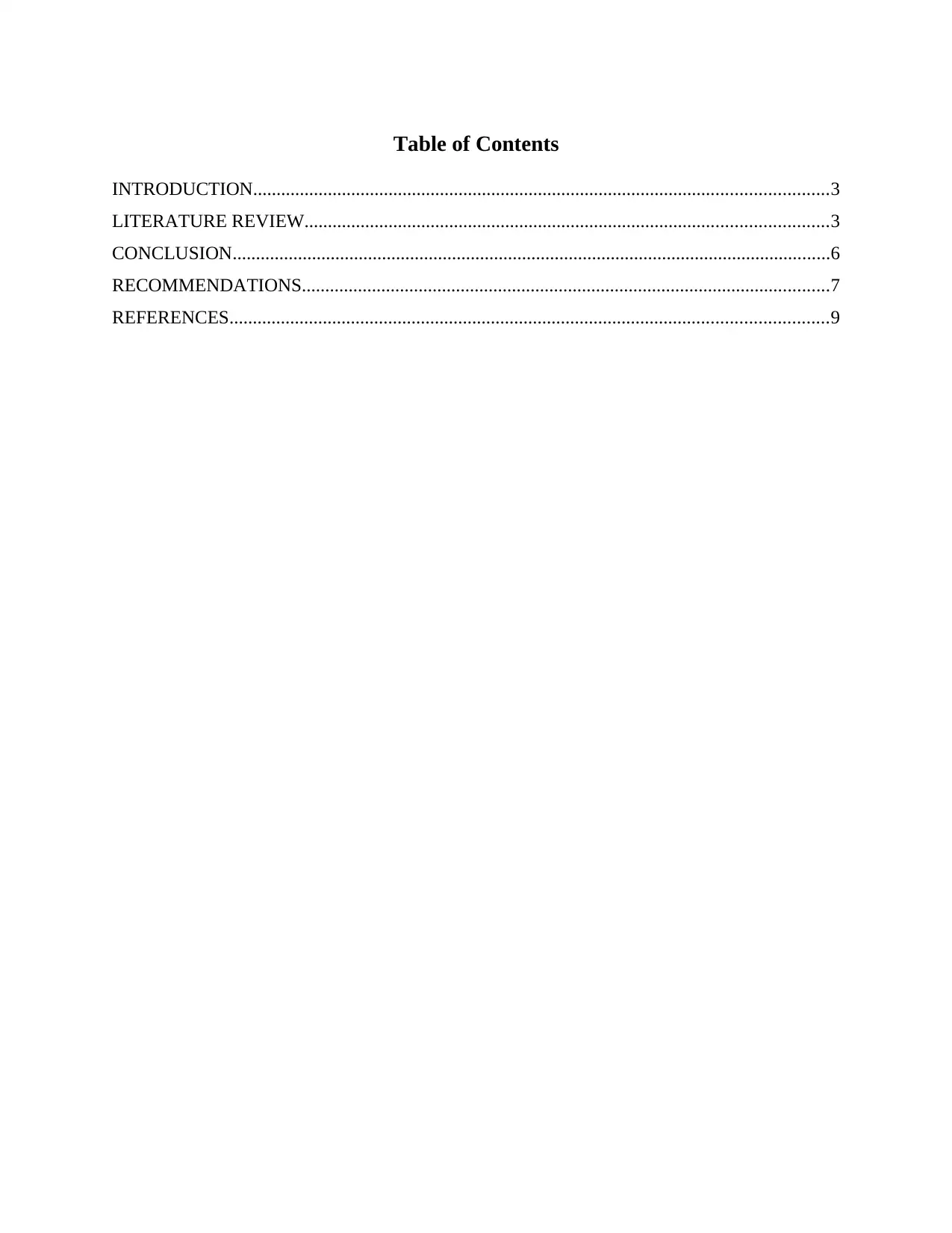
Table of Contents
INTRODUCTION...........................................................................................................................3
LITERATURE REVIEW................................................................................................................3
CONCLUSION................................................................................................................................6
RECOMMENDATIONS.................................................................................................................7
REFERENCES................................................................................................................................9
INTRODUCTION...........................................................................................................................3
LITERATURE REVIEW................................................................................................................3
CONCLUSION................................................................................................................................6
RECOMMENDATIONS.................................................................................................................7
REFERENCES................................................................................................................................9
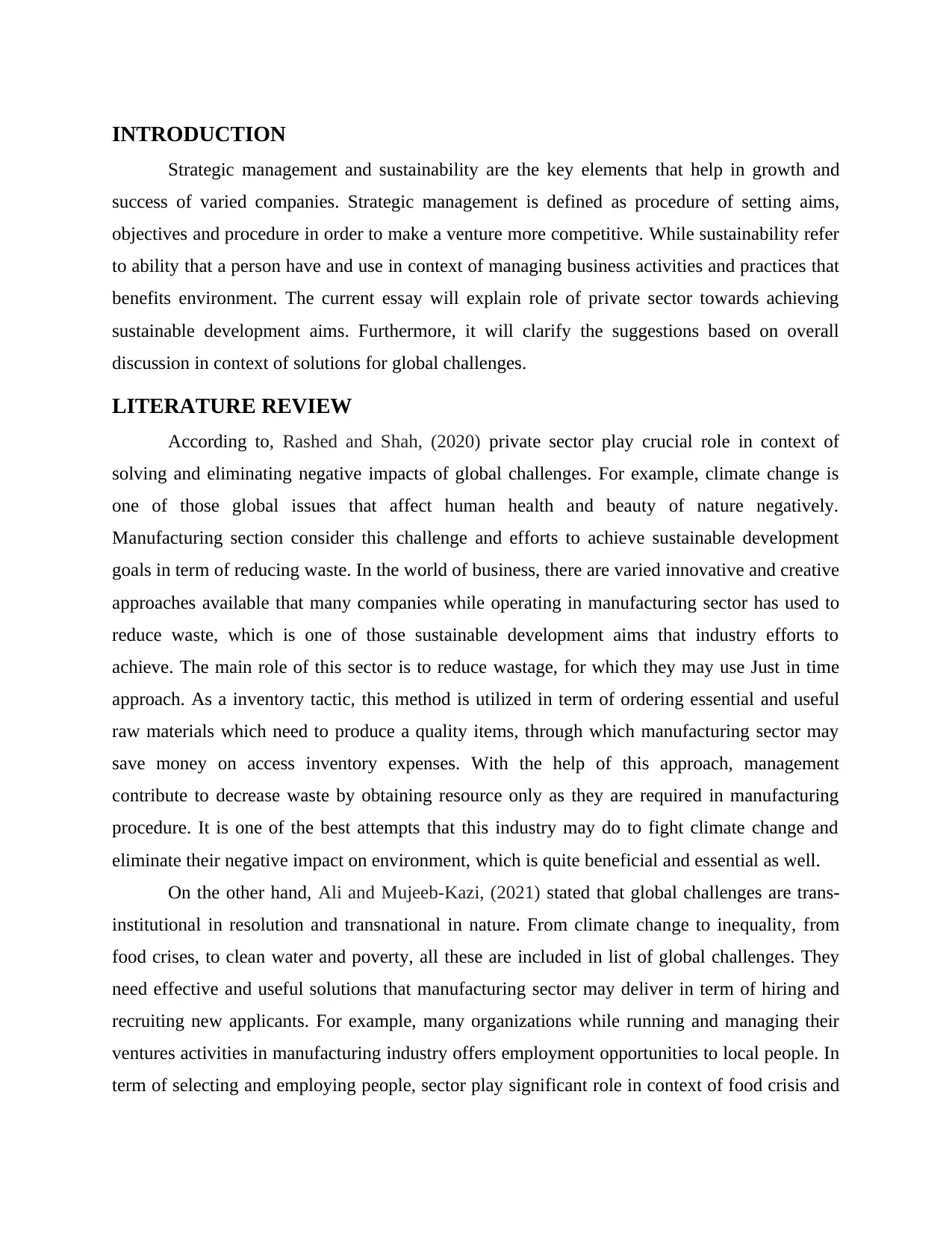
INTRODUCTION
Strategic management and sustainability are the key elements that help in growth and
success of varied companies. Strategic management is defined as procedure of setting aims,
objectives and procedure in order to make a venture more competitive. While sustainability refer
to ability that a person have and use in context of managing business activities and practices that
benefits environment. The current essay will explain role of private sector towards achieving
sustainable development aims. Furthermore, it will clarify the suggestions based on overall
discussion in context of solutions for global challenges.
LITERATURE REVIEW
According to, Rashed and Shah, (2020) private sector play crucial role in context of
solving and eliminating negative impacts of global challenges. For example, climate change is
one of those global issues that affect human health and beauty of nature negatively.
Manufacturing section consider this challenge and efforts to achieve sustainable development
goals in term of reducing waste. In the world of business, there are varied innovative and creative
approaches available that many companies while operating in manufacturing sector has used to
reduce waste, which is one of those sustainable development aims that industry efforts to
achieve. The main role of this sector is to reduce wastage, for which they may use Just in time
approach. As a inventory tactic, this method is utilized in term of ordering essential and useful
raw materials which need to produce a quality items, through which manufacturing sector may
save money on access inventory expenses. With the help of this approach, management
contribute to decrease waste by obtaining resource only as they are required in manufacturing
procedure. It is one of the best attempts that this industry may do to fight climate change and
eliminate their negative impact on environment, which is quite beneficial and essential as well.
On the other hand, Ali and Mujeeb-Kazi, (2021) stated that global challenges are trans-
institutional in resolution and transnational in nature. From climate change to inequality, from
food crises, to clean water and poverty, all these are included in list of global challenges. They
need effective and useful solutions that manufacturing sector may deliver in term of hiring and
recruiting new applicants. For example, many organizations while running and managing their
ventures activities in manufacturing industry offers employment opportunities to local people. In
term of selecting and employing people, sector play significant role in context of food crisis and
Strategic management and sustainability are the key elements that help in growth and
success of varied companies. Strategic management is defined as procedure of setting aims,
objectives and procedure in order to make a venture more competitive. While sustainability refer
to ability that a person have and use in context of managing business activities and practices that
benefits environment. The current essay will explain role of private sector towards achieving
sustainable development aims. Furthermore, it will clarify the suggestions based on overall
discussion in context of solutions for global challenges.
LITERATURE REVIEW
According to, Rashed and Shah, (2020) private sector play crucial role in context of
solving and eliminating negative impacts of global challenges. For example, climate change is
one of those global issues that affect human health and beauty of nature negatively.
Manufacturing section consider this challenge and efforts to achieve sustainable development
goals in term of reducing waste. In the world of business, there are varied innovative and creative
approaches available that many companies while operating in manufacturing sector has used to
reduce waste, which is one of those sustainable development aims that industry efforts to
achieve. The main role of this sector is to reduce wastage, for which they may use Just in time
approach. As a inventory tactic, this method is utilized in term of ordering essential and useful
raw materials which need to produce a quality items, through which manufacturing sector may
save money on access inventory expenses. With the help of this approach, management
contribute to decrease waste by obtaining resource only as they are required in manufacturing
procedure. It is one of the best attempts that this industry may do to fight climate change and
eliminate their negative impact on environment, which is quite beneficial and essential as well.
On the other hand, Ali and Mujeeb-Kazi, (2021) stated that global challenges are trans-
institutional in resolution and transnational in nature. From climate change to inequality, from
food crises, to clean water and poverty, all these are included in list of global challenges. They
need effective and useful solutions that manufacturing sector may deliver in term of hiring and
recruiting new applicants. For example, many organizations while running and managing their
ventures activities in manufacturing industry offers employment opportunities to local people. In
term of selecting and employing people, sector play significant role in context of food crisis and
⊘ This is a preview!⊘
Do you want full access?
Subscribe today to unlock all pages.

Trusted by 1+ million students worldwide
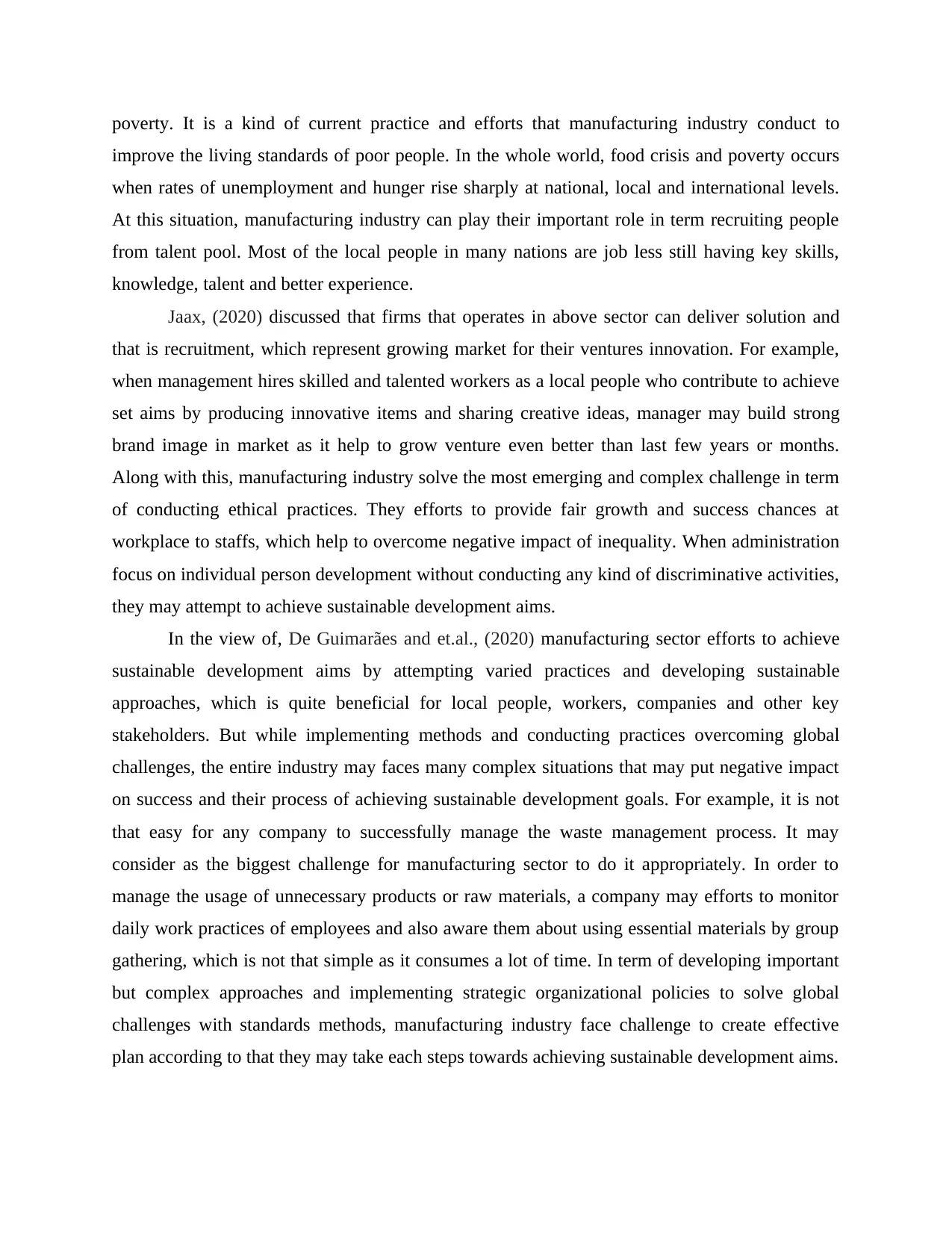
poverty. It is a kind of current practice and efforts that manufacturing industry conduct to
improve the living standards of poor people. In the whole world, food crisis and poverty occurs
when rates of unemployment and hunger rise sharply at national, local and international levels.
At this situation, manufacturing industry can play their important role in term recruiting people
from talent pool. Most of the local people in many nations are job less still having key skills,
knowledge, talent and better experience.
Jaax, (2020) discussed that firms that operates in above sector can deliver solution and
that is recruitment, which represent growing market for their ventures innovation. For example,
when management hires skilled and talented workers as a local people who contribute to achieve
set aims by producing innovative items and sharing creative ideas, manager may build strong
brand image in market as it help to grow venture even better than last few years or months.
Along with this, manufacturing industry solve the most emerging and complex challenge in term
of conducting ethical practices. They efforts to provide fair growth and success chances at
workplace to staffs, which help to overcome negative impact of inequality. When administration
focus on individual person development without conducting any kind of discriminative activities,
they may attempt to achieve sustainable development aims.
In the view of, De Guimarães and et.al., (2020) manufacturing sector efforts to achieve
sustainable development aims by attempting varied practices and developing sustainable
approaches, which is quite beneficial for local people, workers, companies and other key
stakeholders. But while implementing methods and conducting practices overcoming global
challenges, the entire industry may faces many complex situations that may put negative impact
on success and their process of achieving sustainable development goals. For example, it is not
that easy for any company to successfully manage the waste management process. It may
consider as the biggest challenge for manufacturing sector to do it appropriately. In order to
manage the usage of unnecessary products or raw materials, a company may efforts to monitor
daily work practices of employees and also aware them about using essential materials by group
gathering, which is not that simple as it consumes a lot of time. In term of developing important
but complex approaches and implementing strategic organizational policies to solve global
challenges with standards methods, manufacturing industry face challenge to create effective
plan according to that they may take each steps towards achieving sustainable development aims.
improve the living standards of poor people. In the whole world, food crisis and poverty occurs
when rates of unemployment and hunger rise sharply at national, local and international levels.
At this situation, manufacturing industry can play their important role in term recruiting people
from talent pool. Most of the local people in many nations are job less still having key skills,
knowledge, talent and better experience.
Jaax, (2020) discussed that firms that operates in above sector can deliver solution and
that is recruitment, which represent growing market for their ventures innovation. For example,
when management hires skilled and talented workers as a local people who contribute to achieve
set aims by producing innovative items and sharing creative ideas, manager may build strong
brand image in market as it help to grow venture even better than last few years or months.
Along with this, manufacturing industry solve the most emerging and complex challenge in term
of conducting ethical practices. They efforts to provide fair growth and success chances at
workplace to staffs, which help to overcome negative impact of inequality. When administration
focus on individual person development without conducting any kind of discriminative activities,
they may attempt to achieve sustainable development aims.
In the view of, De Guimarães and et.al., (2020) manufacturing sector efforts to achieve
sustainable development aims by attempting varied practices and developing sustainable
approaches, which is quite beneficial for local people, workers, companies and other key
stakeholders. But while implementing methods and conducting practices overcoming global
challenges, the entire industry may faces many complex situations that may put negative impact
on success and their process of achieving sustainable development goals. For example, it is not
that easy for any company to successfully manage the waste management process. It may
consider as the biggest challenge for manufacturing sector to do it appropriately. In order to
manage the usage of unnecessary products or raw materials, a company may efforts to monitor
daily work practices of employees and also aware them about using essential materials by group
gathering, which is not that simple as it consumes a lot of time. In term of developing important
but complex approaches and implementing strategic organizational policies to solve global
challenges with standards methods, manufacturing industry face challenge to create effective
plan according to that they may take each steps towards achieving sustainable development aims.
Paraphrase This Document
Need a fresh take? Get an instant paraphrase of this document with our AI Paraphraser
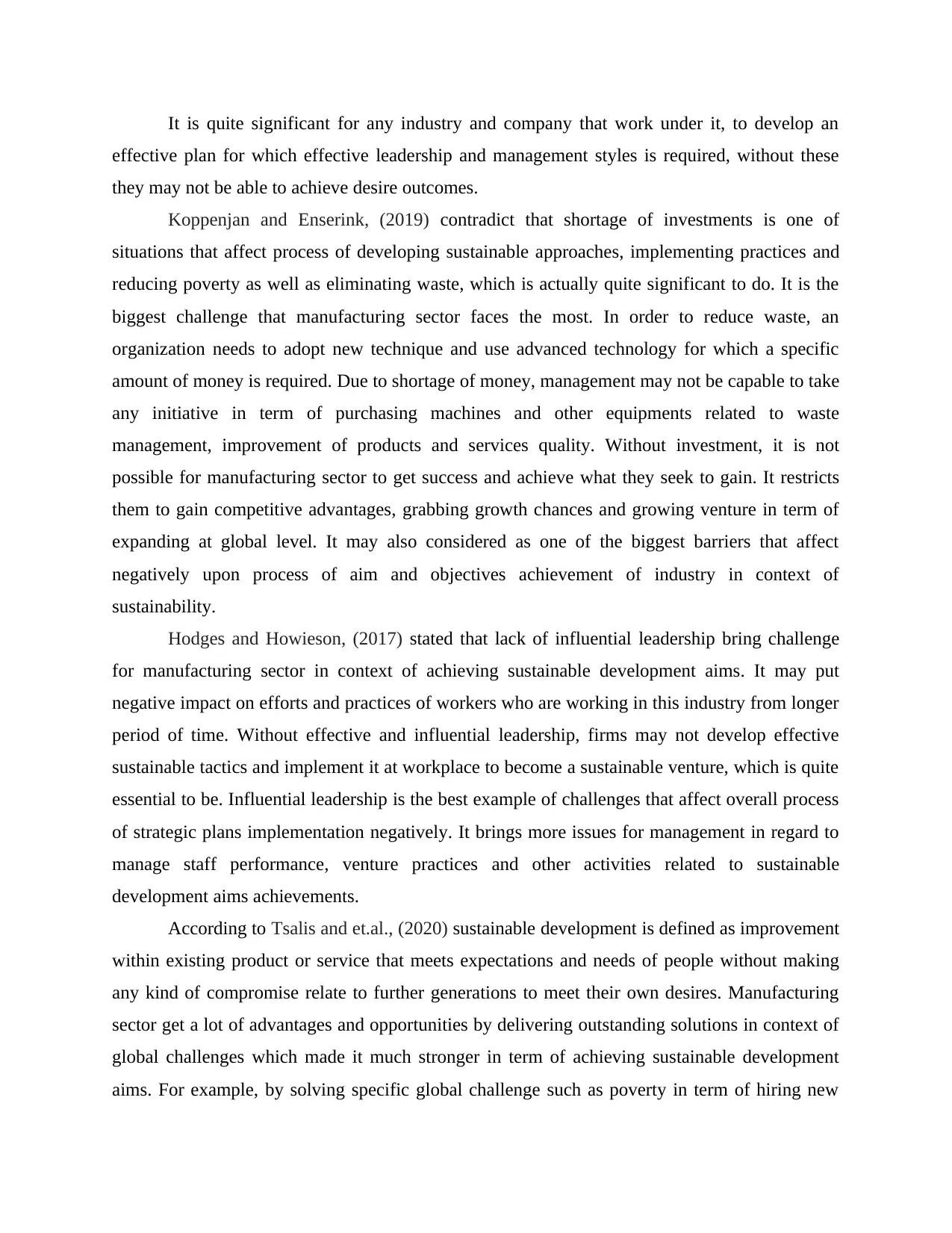
It is quite significant for any industry and company that work under it, to develop an
effective plan for which effective leadership and management styles is required, without these
they may not be able to achieve desire outcomes.
Koppenjan and Enserink, (2019) contradict that shortage of investments is one of
situations that affect process of developing sustainable approaches, implementing practices and
reducing poverty as well as eliminating waste, which is actually quite significant to do. It is the
biggest challenge that manufacturing sector faces the most. In order to reduce waste, an
organization needs to adopt new technique and use advanced technology for which a specific
amount of money is required. Due to shortage of money, management may not be capable to take
any initiative in term of purchasing machines and other equipments related to waste
management, improvement of products and services quality. Without investment, it is not
possible for manufacturing sector to get success and achieve what they seek to gain. It restricts
them to gain competitive advantages, grabbing growth chances and growing venture in term of
expanding at global level. It may also considered as one of the biggest barriers that affect
negatively upon process of aim and objectives achievement of industry in context of
sustainability.
Hodges and Howieson, (2017) stated that lack of influential leadership bring challenge
for manufacturing sector in context of achieving sustainable development aims. It may put
negative impact on efforts and practices of workers who are working in this industry from longer
period of time. Without effective and influential leadership, firms may not develop effective
sustainable tactics and implement it at workplace to become a sustainable venture, which is quite
essential to be. Influential leadership is the best example of challenges that affect overall process
of strategic plans implementation negatively. It brings more issues for management in regard to
manage staff performance, venture practices and other activities related to sustainable
development aims achievements.
According to Tsalis and et.al., (2020) sustainable development is defined as improvement
within existing product or service that meets expectations and needs of people without making
any kind of compromise relate to further generations to meet their own desires. Manufacturing
sector get a lot of advantages and opportunities by delivering outstanding solutions in context of
global challenges which made it much stronger in term of achieving sustainable development
aims. For example, by solving specific global challenge such as poverty in term of hiring new
effective plan for which effective leadership and management styles is required, without these
they may not be able to achieve desire outcomes.
Koppenjan and Enserink, (2019) contradict that shortage of investments is one of
situations that affect process of developing sustainable approaches, implementing practices and
reducing poverty as well as eliminating waste, which is actually quite significant to do. It is the
biggest challenge that manufacturing sector faces the most. In order to reduce waste, an
organization needs to adopt new technique and use advanced technology for which a specific
amount of money is required. Due to shortage of money, management may not be capable to take
any initiative in term of purchasing machines and other equipments related to waste
management, improvement of products and services quality. Without investment, it is not
possible for manufacturing sector to get success and achieve what they seek to gain. It restricts
them to gain competitive advantages, grabbing growth chances and growing venture in term of
expanding at global level. It may also considered as one of the biggest barriers that affect
negatively upon process of aim and objectives achievement of industry in context of
sustainability.
Hodges and Howieson, (2017) stated that lack of influential leadership bring challenge
for manufacturing sector in context of achieving sustainable development aims. It may put
negative impact on efforts and practices of workers who are working in this industry from longer
period of time. Without effective and influential leadership, firms may not develop effective
sustainable tactics and implement it at workplace to become a sustainable venture, which is quite
essential to be. Influential leadership is the best example of challenges that affect overall process
of strategic plans implementation negatively. It brings more issues for management in regard to
manage staff performance, venture practices and other activities related to sustainable
development aims achievements.
According to Tsalis and et.al., (2020) sustainable development is defined as improvement
within existing product or service that meets expectations and needs of people without making
any kind of compromise relate to further generations to meet their own desires. Manufacturing
sector get a lot of advantages and opportunities by delivering outstanding solutions in context of
global challenges which made it much stronger in term of achieving sustainable development
aims. For example, by solving specific global challenge such as poverty in term of hiring new
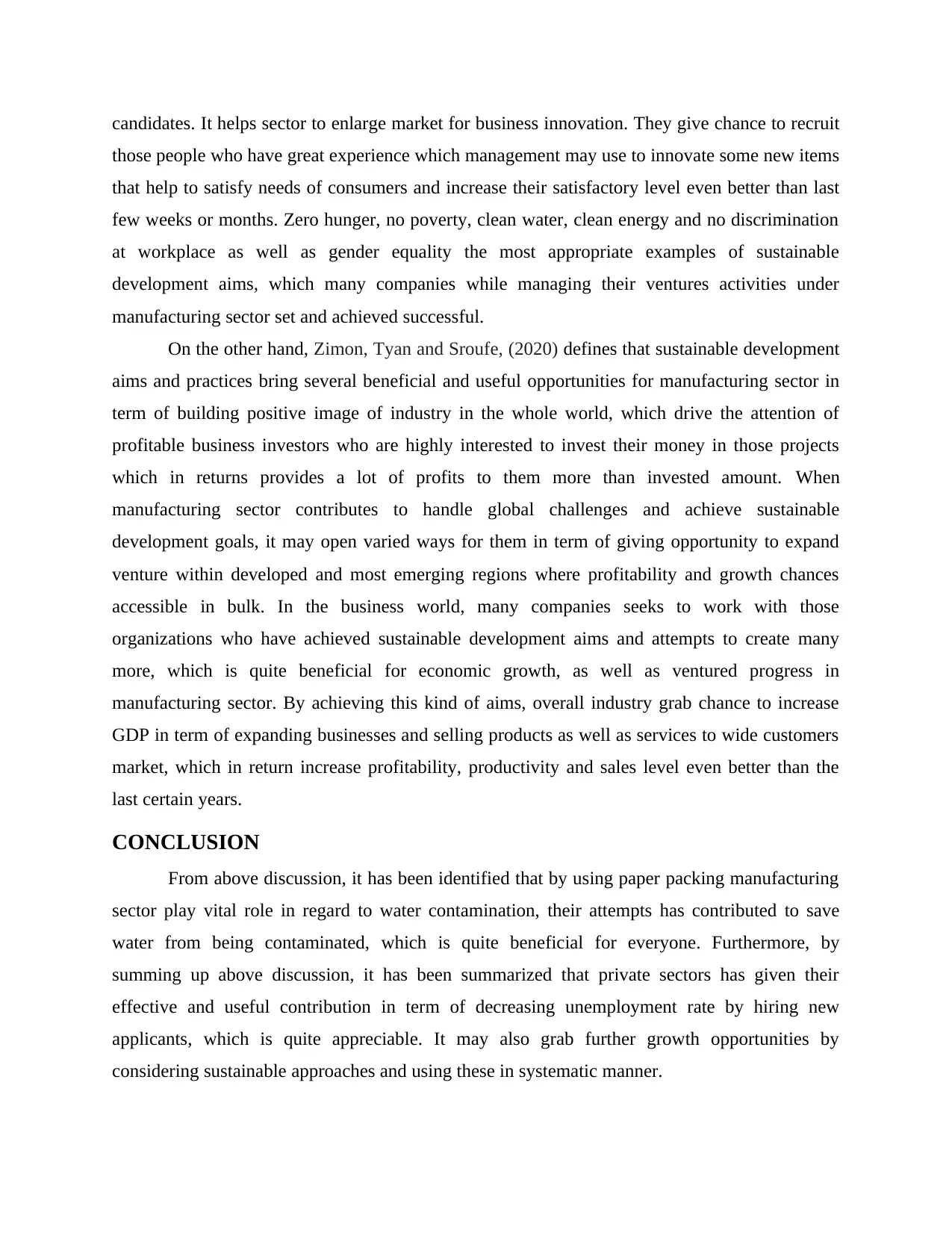
candidates. It helps sector to enlarge market for business innovation. They give chance to recruit
those people who have great experience which management may use to innovate some new items
that help to satisfy needs of consumers and increase their satisfactory level even better than last
few weeks or months. Zero hunger, no poverty, clean water, clean energy and no discrimination
at workplace as well as gender equality the most appropriate examples of sustainable
development aims, which many companies while managing their ventures activities under
manufacturing sector set and achieved successful.
On the other hand, Zimon, Tyan and Sroufe, (2020) defines that sustainable development
aims and practices bring several beneficial and useful opportunities for manufacturing sector in
term of building positive image of industry in the whole world, which drive the attention of
profitable business investors who are highly interested to invest their money in those projects
which in returns provides a lot of profits to them more than invested amount. When
manufacturing sector contributes to handle global challenges and achieve sustainable
development goals, it may open varied ways for them in term of giving opportunity to expand
venture within developed and most emerging regions where profitability and growth chances
accessible in bulk. In the business world, many companies seeks to work with those
organizations who have achieved sustainable development aims and attempts to create many
more, which is quite beneficial for economic growth, as well as ventured progress in
manufacturing sector. By achieving this kind of aims, overall industry grab chance to increase
GDP in term of expanding businesses and selling products as well as services to wide customers
market, which in return increase profitability, productivity and sales level even better than the
last certain years.
CONCLUSION
From above discussion, it has been identified that by using paper packing manufacturing
sector play vital role in regard to water contamination, their attempts has contributed to save
water from being contaminated, which is quite beneficial for everyone. Furthermore, by
summing up above discussion, it has been summarized that private sectors has given their
effective and useful contribution in term of decreasing unemployment rate by hiring new
applicants, which is quite appreciable. It may also grab further growth opportunities by
considering sustainable approaches and using these in systematic manner.
those people who have great experience which management may use to innovate some new items
that help to satisfy needs of consumers and increase their satisfactory level even better than last
few weeks or months. Zero hunger, no poverty, clean water, clean energy and no discrimination
at workplace as well as gender equality the most appropriate examples of sustainable
development aims, which many companies while managing their ventures activities under
manufacturing sector set and achieved successful.
On the other hand, Zimon, Tyan and Sroufe, (2020) defines that sustainable development
aims and practices bring several beneficial and useful opportunities for manufacturing sector in
term of building positive image of industry in the whole world, which drive the attention of
profitable business investors who are highly interested to invest their money in those projects
which in returns provides a lot of profits to them more than invested amount. When
manufacturing sector contributes to handle global challenges and achieve sustainable
development goals, it may open varied ways for them in term of giving opportunity to expand
venture within developed and most emerging regions where profitability and growth chances
accessible in bulk. In the business world, many companies seeks to work with those
organizations who have achieved sustainable development aims and attempts to create many
more, which is quite beneficial for economic growth, as well as ventured progress in
manufacturing sector. By achieving this kind of aims, overall industry grab chance to increase
GDP in term of expanding businesses and selling products as well as services to wide customers
market, which in return increase profitability, productivity and sales level even better than the
last certain years.
CONCLUSION
From above discussion, it has been identified that by using paper packing manufacturing
sector play vital role in regard to water contamination, their attempts has contributed to save
water from being contaminated, which is quite beneficial for everyone. Furthermore, by
summing up above discussion, it has been summarized that private sectors has given their
effective and useful contribution in term of decreasing unemployment rate by hiring new
applicants, which is quite appreciable. It may also grab further growth opportunities by
considering sustainable approaches and using these in systematic manner.
⊘ This is a preview!⊘
Do you want full access?
Subscribe today to unlock all pages.

Trusted by 1+ million students worldwide
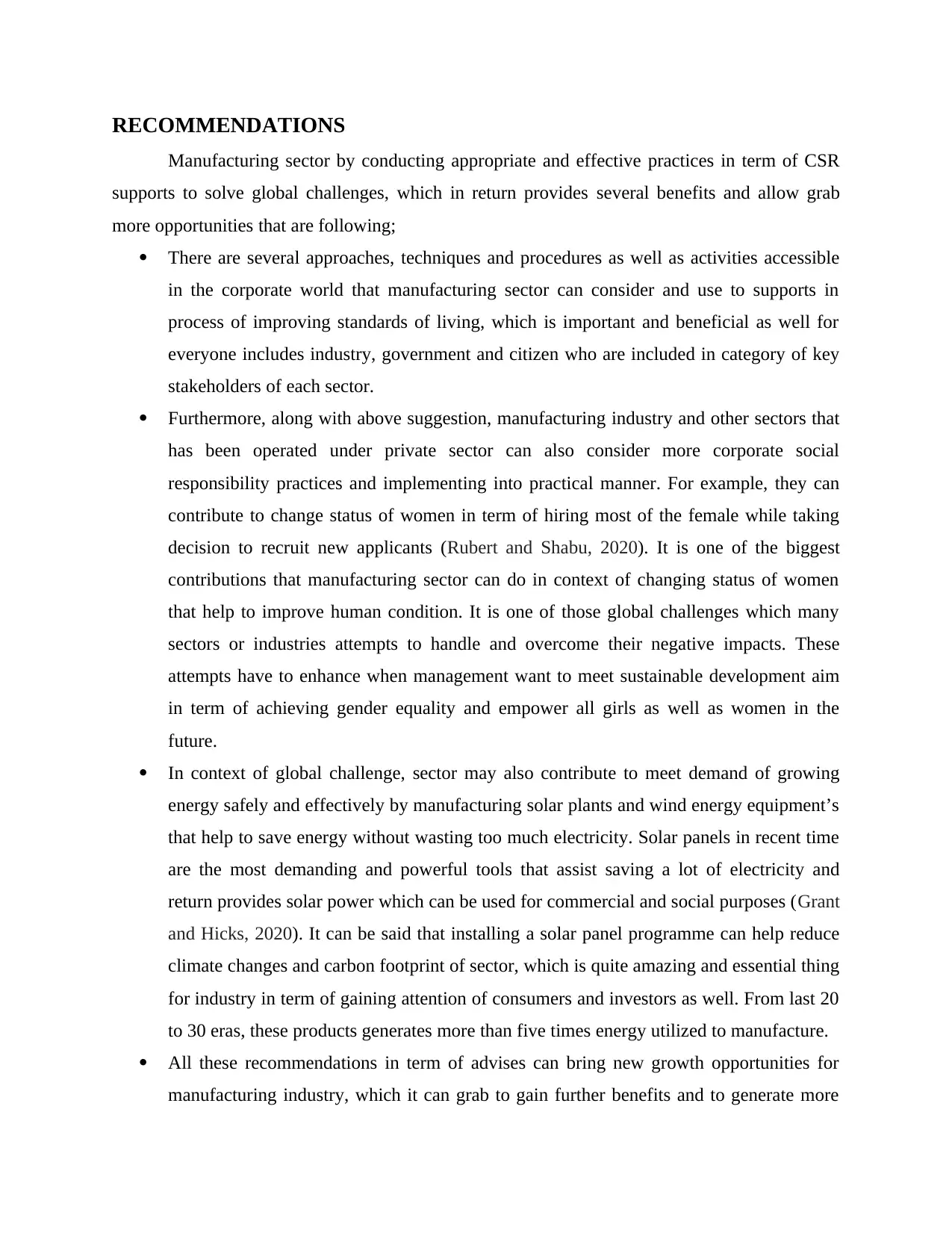
RECOMMENDATIONS
Manufacturing sector by conducting appropriate and effective practices in term of CSR
supports to solve global challenges, which in return provides several benefits and allow grab
more opportunities that are following;
There are several approaches, techniques and procedures as well as activities accessible
in the corporate world that manufacturing sector can consider and use to supports in
process of improving standards of living, which is important and beneficial as well for
everyone includes industry, government and citizen who are included in category of key
stakeholders of each sector.
Furthermore, along with above suggestion, manufacturing industry and other sectors that
has been operated under private sector can also consider more corporate social
responsibility practices and implementing into practical manner. For example, they can
contribute to change status of women in term of hiring most of the female while taking
decision to recruit new applicants (Rubert and Shabu, 2020). It is one of the biggest
contributions that manufacturing sector can do in context of changing status of women
that help to improve human condition. It is one of those global challenges which many
sectors or industries attempts to handle and overcome their negative impacts. These
attempts have to enhance when management want to meet sustainable development aim
in term of achieving gender equality and empower all girls as well as women in the
future.
In context of global challenge, sector may also contribute to meet demand of growing
energy safely and effectively by manufacturing solar plants and wind energy equipment’s
that help to save energy without wasting too much electricity. Solar panels in recent time
are the most demanding and powerful tools that assist saving a lot of electricity and
return provides solar power which can be used for commercial and social purposes (Grant
and Hicks, 2020). It can be said that installing a solar panel programme can help reduce
climate changes and carbon footprint of sector, which is quite amazing and essential thing
for industry in term of gaining attention of consumers and investors as well. From last 20
to 30 eras, these products generates more than five times energy utilized to manufacture.
All these recommendations in term of advises can bring new growth opportunities for
manufacturing industry, which it can grab to gain further benefits and to generate more
Manufacturing sector by conducting appropriate and effective practices in term of CSR
supports to solve global challenges, which in return provides several benefits and allow grab
more opportunities that are following;
There are several approaches, techniques and procedures as well as activities accessible
in the corporate world that manufacturing sector can consider and use to supports in
process of improving standards of living, which is important and beneficial as well for
everyone includes industry, government and citizen who are included in category of key
stakeholders of each sector.
Furthermore, along with above suggestion, manufacturing industry and other sectors that
has been operated under private sector can also consider more corporate social
responsibility practices and implementing into practical manner. For example, they can
contribute to change status of women in term of hiring most of the female while taking
decision to recruit new applicants (Rubert and Shabu, 2020). It is one of the biggest
contributions that manufacturing sector can do in context of changing status of women
that help to improve human condition. It is one of those global challenges which many
sectors or industries attempts to handle and overcome their negative impacts. These
attempts have to enhance when management want to meet sustainable development aim
in term of achieving gender equality and empower all girls as well as women in the
future.
In context of global challenge, sector may also contribute to meet demand of growing
energy safely and effectively by manufacturing solar plants and wind energy equipment’s
that help to save energy without wasting too much electricity. Solar panels in recent time
are the most demanding and powerful tools that assist saving a lot of electricity and
return provides solar power which can be used for commercial and social purposes (Grant
and Hicks, 2020). It can be said that installing a solar panel programme can help reduce
climate changes and carbon footprint of sector, which is quite amazing and essential thing
for industry in term of gaining attention of consumers and investors as well. From last 20
to 30 eras, these products generates more than five times energy utilized to manufacture.
All these recommendations in term of advises can bring new growth opportunities for
manufacturing industry, which it can grab to gain further benefits and to generate more
Paraphrase This Document
Need a fresh take? Get an instant paraphrase of this document with our AI Paraphraser

revenues, which it will use for good contribution in context of society, economy and
other major global concerns.
other major global concerns.
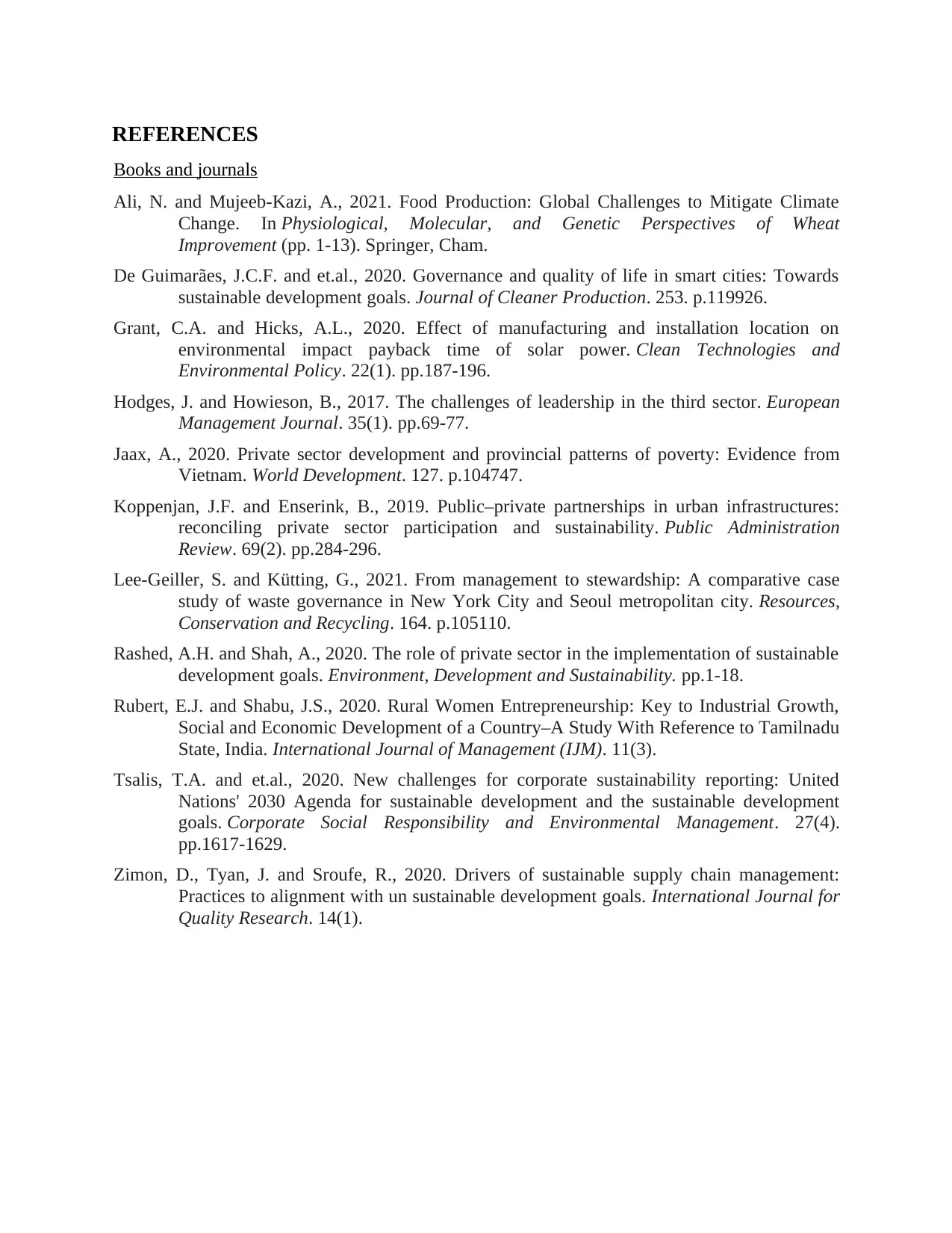
REFERENCES
Books and journals
Ali, N. and Mujeeb-Kazi, A., 2021. Food Production: Global Challenges to Mitigate Climate
Change. In Physiological, Molecular, and Genetic Perspectives of Wheat
Improvement (pp. 1-13). Springer, Cham.
De Guimarães, J.C.F. and et.al., 2020. Governance and quality of life in smart cities: Towards
sustainable development goals. Journal of Cleaner Production. 253. p.119926.
Grant, C.A. and Hicks, A.L., 2020. Effect of manufacturing and installation location on
environmental impact payback time of solar power. Clean Technologies and
Environmental Policy. 22(1). pp.187-196.
Hodges, J. and Howieson, B., 2017. The challenges of leadership in the third sector. European
Management Journal. 35(1). pp.69-77.
Jaax, A., 2020. Private sector development and provincial patterns of poverty: Evidence from
Vietnam. World Development. 127. p.104747.
Koppenjan, J.F. and Enserink, B., 2019. Public–private partnerships in urban infrastructures:
reconciling private sector participation and sustainability. Public Administration
Review. 69(2). pp.284-296.
Lee-Geiller, S. and Kütting, G., 2021. From management to stewardship: A comparative case
study of waste governance in New York City and Seoul metropolitan city. Resources,
Conservation and Recycling. 164. p.105110.
Rashed, A.H. and Shah, A., 2020. The role of private sector in the implementation of sustainable
development goals. Environment, Development and Sustainability. pp.1-18.
Rubert, E.J. and Shabu, J.S., 2020. Rural Women Entrepreneurship: Key to Industrial Growth,
Social and Economic Development of a Country–A Study With Reference to Tamilnadu
State, India. International Journal of Management (IJM). 11(3).
Tsalis, T.A. and et.al., 2020. New challenges for corporate sustainability reporting: United
Nations' 2030 Agenda for sustainable development and the sustainable development
goals. Corporate Social Responsibility and Environmental Management. 27(4).
pp.1617-1629.
Zimon, D., Tyan, J. and Sroufe, R., 2020. Drivers of sustainable supply chain management:
Practices to alignment with un sustainable development goals. International Journal for
Quality Research. 14(1).
Books and journals
Ali, N. and Mujeeb-Kazi, A., 2021. Food Production: Global Challenges to Mitigate Climate
Change. In Physiological, Molecular, and Genetic Perspectives of Wheat
Improvement (pp. 1-13). Springer, Cham.
De Guimarães, J.C.F. and et.al., 2020. Governance and quality of life in smart cities: Towards
sustainable development goals. Journal of Cleaner Production. 253. p.119926.
Grant, C.A. and Hicks, A.L., 2020. Effect of manufacturing and installation location on
environmental impact payback time of solar power. Clean Technologies and
Environmental Policy. 22(1). pp.187-196.
Hodges, J. and Howieson, B., 2017. The challenges of leadership in the third sector. European
Management Journal. 35(1). pp.69-77.
Jaax, A., 2020. Private sector development and provincial patterns of poverty: Evidence from
Vietnam. World Development. 127. p.104747.
Koppenjan, J.F. and Enserink, B., 2019. Public–private partnerships in urban infrastructures:
reconciling private sector participation and sustainability. Public Administration
Review. 69(2). pp.284-296.
Lee-Geiller, S. and Kütting, G., 2021. From management to stewardship: A comparative case
study of waste governance in New York City and Seoul metropolitan city. Resources,
Conservation and Recycling. 164. p.105110.
Rashed, A.H. and Shah, A., 2020. The role of private sector in the implementation of sustainable
development goals. Environment, Development and Sustainability. pp.1-18.
Rubert, E.J. and Shabu, J.S., 2020. Rural Women Entrepreneurship: Key to Industrial Growth,
Social and Economic Development of a Country–A Study With Reference to Tamilnadu
State, India. International Journal of Management (IJM). 11(3).
Tsalis, T.A. and et.al., 2020. New challenges for corporate sustainability reporting: United
Nations' 2030 Agenda for sustainable development and the sustainable development
goals. Corporate Social Responsibility and Environmental Management. 27(4).
pp.1617-1629.
Zimon, D., Tyan, J. and Sroufe, R., 2020. Drivers of sustainable supply chain management:
Practices to alignment with un sustainable development goals. International Journal for
Quality Research. 14(1).
⊘ This is a preview!⊘
Do you want full access?
Subscribe today to unlock all pages.

Trusted by 1+ million students worldwide
1 out of 9
Related Documents
Your All-in-One AI-Powered Toolkit for Academic Success.
+13062052269
info@desklib.com
Available 24*7 on WhatsApp / Email
![[object Object]](/_next/static/media/star-bottom.7253800d.svg)
Unlock your academic potential
Copyright © 2020–2026 A2Z Services. All Rights Reserved. Developed and managed by ZUCOL.





